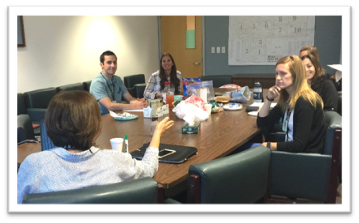DSH-Metropolitan Clinical Psychology Doctoral Internship: What to Expect

Interns at DSH-Metropolitan can expect to have a robust and exciting training experience. The internship is challenging but rewarding due to the workload, the complex population we serve, and the natural trials of transitioning from student to professional practitioner. We take pride in providing careful guidance and support for our interns while also supporting them in developing independence and assertiveness, with consideration for their emerging professional identity. The most successful interns are motivated, self-sufficient, and collaborative; self-driven learners and critical thinkers have the most rewarding internship experiences at DSH-M.
We take the safety and security of our interns seriously and encourage our interns to prioritize their safety above all else.
Sample Of Weekly Schedule for Treatment Unit Rotation
| Time | Monday | Tuesday | Wednesday | Thursday | Friday |
|---|---|---|---|---|---|
| 8:00-9:00 | Morning Report w unit staff | Morning Report w unit staff | Morning Report w unit staff | Morning Report w unit staff | Morning Report w unit staff |
| 9:00-10:00 | Treatment conference | Check in with patients | Treatment conference | Check in with patients | Check in with patients |
| 10:30-11:30 | Testing administration | Group therapy | Testing administration | Group therapy | Group therapy |
| 11:30-12:00 | Testing administration | Notes and paperwork | Testing administration | Notes and paperwork | Notes and paperwork |
| 12:00-1:00 | Lunch | Lunch | Lunch | Lunch | Lunch |
| 1:00-2:00 | Individual therapy | Group therapy | Individual therapy | Group therapy | Individual therapy |
| 2:00-3:30 | Individual supervision | Didactic presentation | Group supervision | Administrative services | Report writing |
| 3:30-4:30 | Professional development, reading | Didactic presentation | Group supervision | Report writing and notes | Report writing |
| 4:30-5:00 | Administrative tasks | Administrative tasks | Administrative tasks | Administrative tasks | Administrative tasks |
Sample Of Daily Schedule for Patient Treatment
| Time | Monday |
|---|---|
| 7:00-8:00 | Breakfast & morning hygiene |
| 8:00-9:00 | AM medications |
| 9:00-9:30 | AM free time (Treatment plan meetings) |
| 9:40-10:30 | AM Group 1 |
| 10:40-11:30 | AM Group 2 |
| 11:45-12:30 | Lunch |
| 12:30-1:30 | PM free time |
| 2:30-3:30 | PM medications |
| 3:40-4:30 | PM Group 1 |
| 4:30-5:00 | PM free time (Patio break) |
| 5:00-5:30 | Dinner |
| 5:30-7:30 | PM hygiene & personal time |
| 7:30-8:00 | PM medications |
| 8:00 | Lights out |
Sample Didactic Topics
Clinical Interviewing
Forensic Report Writing
Competency Evaluations
Malingering Assessment
Criminal Responsibility Evaluations
Behavioral Plans
Violence Risk Assessment
Suicide Risk Assessment
Cognitive Screening Tools
Mild Traumatic Brain Injury
Expert Witness Testimony
Personality Assessment
Sex Offender Risk Assessment
Preparing for Postdoctoral Fellowships
Transitioning From Internship to Career
Conducting Culturally Informed Assessments

